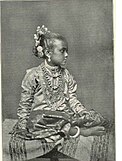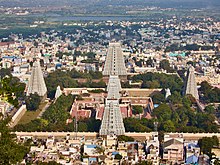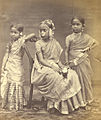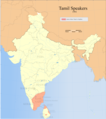Portal:Tamils
The Tamils portal
The Tamil people, also known as Tamilar (Tamil: தமிழர், romanized: Tamiḻar, pronounced [t̪amiɻaɾ] in the singular or தமிழர்கள், Tamiḻarkaḷ, [t̪amiɻaɾɡaɭ] in the plural), Tamilians, or simply Tamils (/ˈtæmɪlz, ˈtɑː-/ TAM-ilz, TAHM-), are a dravidian ethnolinguistic group who natively speak the Tamil language and trace their ancestry mainly to India's southern state of Tamil Nadu, to the union territory of Puducherry, and to Sri Lanka. The Tamil language is one of the world's longest-surviving classical languages, with over 2000 years of Tamil literature, including the Sangam poems, which were composed between 300 BCE and 300 CE. People who speak Tamil as their mother tongue and are born in are considered Tamils.
Tamils constitute 5.9% of the population in India (concentrated mainly in Tamil Nadu and Puducherry), 15% in Sri Lanka (excluding Eelam Moors), 7% in Malaysia, and 5% in Singapore. From the 4th century BCE, urbanisation and mercantile activity along the western and eastern coasts of Tamilakam -- what is today Kerala and Tamil Nadu -- led to the development of four large Tamil empires, the Cheras, Cholas, Pandyas, Pallavas, and velirs and a number of smaller states, all of whom were warring amongst themselves for dominance. The Jaffna Kingdom, and vanni chieftaincies inhabited by Eelam Tamils, was once one of the strongest kingdoms of Sri Lanka and controlled much of the north of the island. (Full article...) Selected article -Arunachalesvara Temple (also called Annamalaiyar Temple) is a Hindu temple dedicated to the deity Shiva, located at the base of Arunachala hill in the town of Tiruvannamalai in Tamil Nadu, India. It is significant to the Hindu sect of Shaivism as one of the temples associated with the five elements, the Pancha Bhuta Sthalams, and specifically the element of fire, or Agni. Shiva is worshipped as Arunachalesvara or Annamalaiyar, and is represented by the lingam, with his idol referred to as Agni lingam. His consort Parvati is depicted as Unnamalai Amman or Apithakucha Ambal. The presiding deity is revered in the 7th-century Tamil Saiva canonical work, the Tevaram, written by Tamil saint poets known as the nayanars and classified as Paadal Petra Sthalam. The 9th-century Shaiva saint poet Manikkavasagar composed the Tiruvempavai here. (Full article...)General imagesSelected biography -Ilaiyaraaja (born R. Gnanathesikan, 3 June 1943) is an Indian musician, composer, arranger, conductor, orchestrator, multi-instrumentalist, lyricist and singer, popular for his works in Indian cinema, prominently in Tamil films. Reputed to be one of the most prolific composers in a career spanning over forty-seven years, he has composed over 7,000 songs and provided film scores for over 1,000 films, apart from performing in over 20,000 concerts. He is nicknamed "Isaignani" (the musical sage) and often referred to as "Maestro", the title conferred by the Royal Philharmonic Orchestra, London. Ilaiyaraaja was also one of the earliest Indian film composers to use Western classical music harmonies and string arrangements in Indian film music, and the first South Asian to compose a full symphony. In 1986, he became the first Indian composer to record a soundtrack with computer for the film Vikram. He also composed Thiruvasagam in Symphony (2006), the first Indian oratorio. (Full article...)CategoriesTopicsTamil People Countrywide: India • Sri Lanka • Canada • Malaysia • Singapore • South Africa • England Related Ethnic Groups: Brahui • Gond • Kannadiga • Khonds • Kodava • Oraon • Malayali • Telugus • Tuluvas Related indigenous Groups: Badagas • Toda • Kuruba
See also: List of Tamil people, Tamil script, Tamil Script Code for Information Interchange Related portalsWikiProjectsThings to do
Associated WikimediaThe following Wikimedia Foundation sister projects provide more on this subject:
Discover Wikipedia using portals |
































































